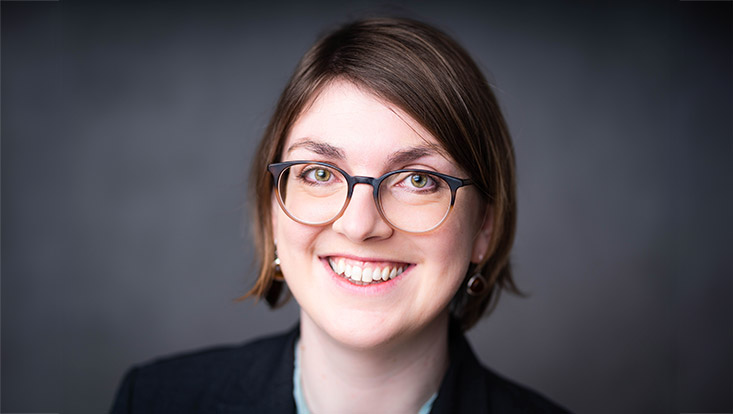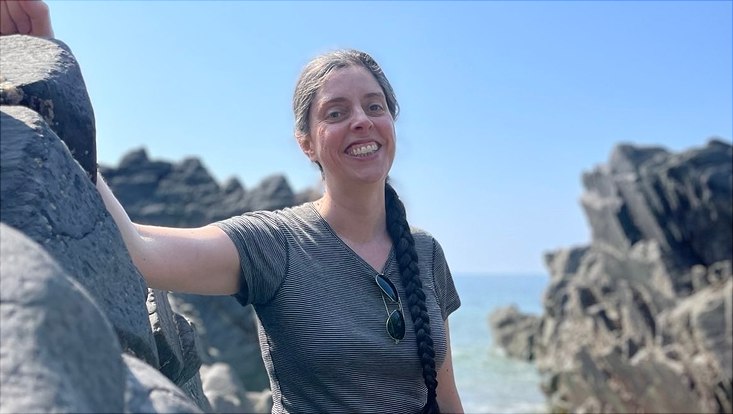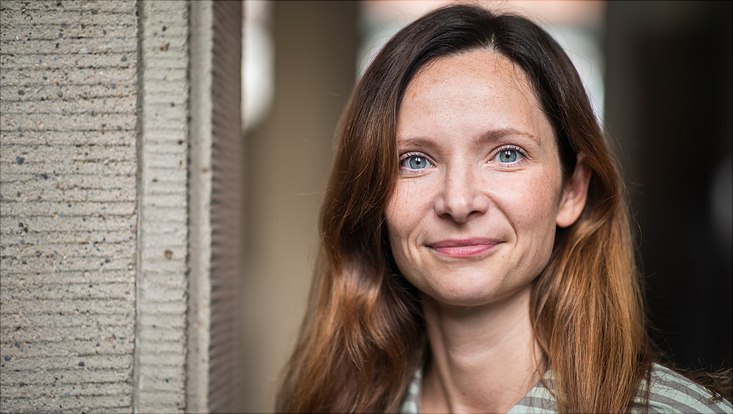Welcome aboard!Questioning Preconceptions and Changing PerspectivesProf. Dr. Barbara Henning strengthens the Humanities
16 October 2024, by Henning/Red.

Photo: Ulli Wrede
Every year, the University of Hamburg welcomes numerous new researchers. This series introduces them and their areas of research. This time: Professor of Turkish Studies, Dr. Barbara Henning.
Prof. Dr. Barbara Henning joined the Faculty of Humanities as a professor of Turkish studies in Winter Semester 2024/25 after her tenure at the Johannes Gutenberg University Mainz.
My research area in 3 sentences:
As a historian, my research focuses on the history of Turkey and the Ottoman Empire. I am particularly interested in how historical actors experienced and coped with transition processes, for example, the end of the Ottoman Empire and the emergence of new borders and nation states in the region after the First World War. To find out more, I look at educational biographies, shifts in status and privilege, or changing linguistic landscapes, for example.
This is how I explain my research to my family:
The most obvious thing about the keyword “Turkish studies” is the reference to one of my central research languages, Turkish. Turkish studies works in a very similar way to the better-known subjects of German or English studies, i.e., using language to find out more about the history, literature, religious beliefs, and everyday life of people in the regions that were once part of the Ottoman Empire—both in the present and in the past.
On closer inspection, however, contexts are often multilingual or have an impact far beyond the borders of present-day Turkey. So we often need to include other contact languages such as Arabic and others as well as modern and Ottoman Turkish for a comprehensive understanding. Regions in the wider Mediterranean or even beyond may also need to be considered. This is why the label “Turkish studies” is a little misleading. But it is also a lot of fun to work within these interrelationships, and continuously put assumptions to the test and to trace connections.
In Hamburg, the city and the University, I am looking forward to:
I look forward to working closely, in research and in teaching, with colleagues in related subjects such as Islamic Studies, Iranian Studies, and History. I am very much looking forward to the new ideas and inspirations that arise from this exchange, some of which are already emerging, for example on questions of contact linguistics or in comparative thinking about genealogical ideas.
I am looking forward to working with my team to shape teaching in our subject at a time of rapid and exciting change in such a way to pique the interest of even more students and equip them well to engage with the history of Turkey and the Ottoman Empire. And last but not least, I am very curious to find out more about the history of the city of Hamburg and thereby also discover connections to Ottoman and Turkish history.
This is why students should attend my courses:
Studying the history of Turkey and the Ottoman Empire encourages people to question their own preconceptions and helps shift their perspective. For example, asking whether our terminology and the ideas behind it really apply to contexts outside European history? What are other possible concepts, questions, or findings?
Working with the source language Ottoman, which incorporates elements from Turkish, Arabic, and Persian forces us to take our time, as the complexity requires us to look very closely and hold various possible interpretations in our heads at the same time. The effort is worth it though, as it gives students an early insight into previously underutilized or unconsidered source material in their own research projects and allows them to quickly connect with current discussions in research on an equal footing.
In a small subject such as Turkish studies, intensive and individual support can be implemented particularly effectively. That means I can help students develop their own research profile and incorporate their interests, previous knowledge, and strengths.
These are my plans at the University of Hamburg:
I would like to take an even more transregional approach to Turkish and Ottoman studies, and specifically interrogate linkages to neighboring regions and historical contexts—in the search for productive common and interdisciplinary questions.
In recent years, I have been involved in the DFG priority program Transottomanica which has allowed me to engage in exciting discussions with colleagues from very different disciplines on precisely this change of perspective towards the history of interconnection. For example, what happens when we all look at the space influenced by or interacting with the Ottomans and map how actors, goods, and ideas move and change within it? The enthusiasm for this continues to have an effect on me, and I have resolved to carry it over into research-related teaching in particular.
Reaching out to the world: I work with the following international and federal institutions and universities:
In addition to partners in Turkey, the USA, and France, northern Iraq is currently an important reference point for my research work. Last year, I worked with colleagues at the universities of Erbil and Graz and with a school museum in northern Iraq on a project on the history of education. That project aimed at making parts of the exhibition in the museum digitally accessible. This exchange was accompanied by a joint study on the educational biographies and networks of the teachers who have worked at this school since the early 20th century. The teacher directories in the school archives provided us with a unique and illustrative source, including portrait photos of all registered teachers.
This cooperation with northern Iraq is also reflected in my teaching. Last semester, my students and fellow Iraqi students read reports by travelers in the Mediterranean region from the Middle Ages and the early modern period and discussed their observations online. We are planning to continue this in Summer Semester 2025.
My research is important to society because:
One of the tasks of Turkish and Ottoman studies is to keep putting up warning signs: “Be careful, don’t be so quick to generalize... this is where it gets complicated!” Research into historical transition processes in the post-Ottoman context in particular helps to develop a nuanced understanding of dynamics and phenomena that still have an impact on political and social structures in the Middle East today and also shape current challenges.
The examination of specific examples, life stories, and micro-studies from the late Ottoman period helps to categorize and question the prevailing narratives of nation-state historiography. The study of Ottoman and Turkish sources repeatedly reminds us of the polyphony, complexity, and inherent logic of these historical contexts characterized by multiple affiliations and ambivalences.


